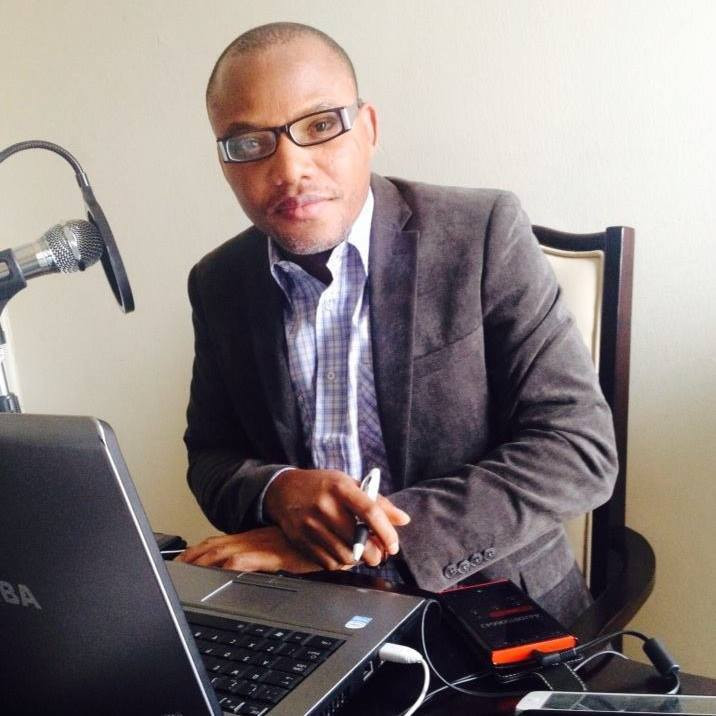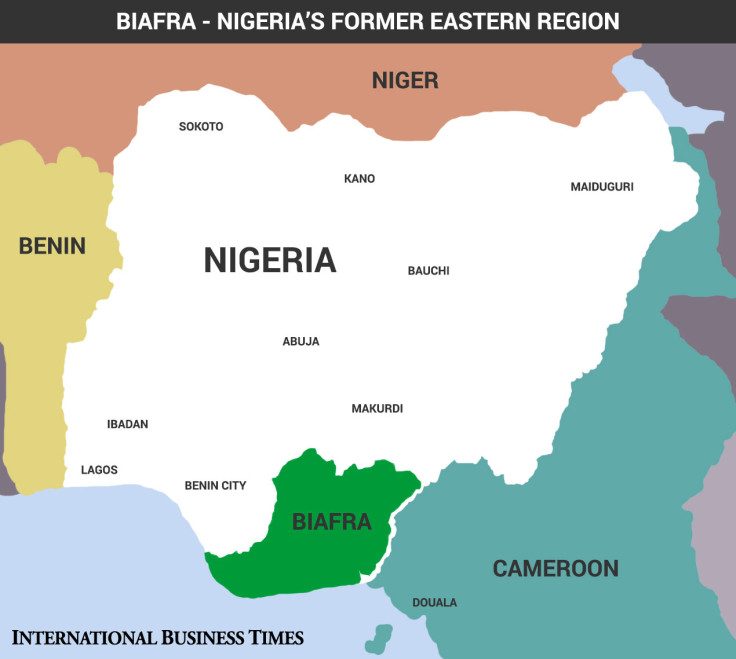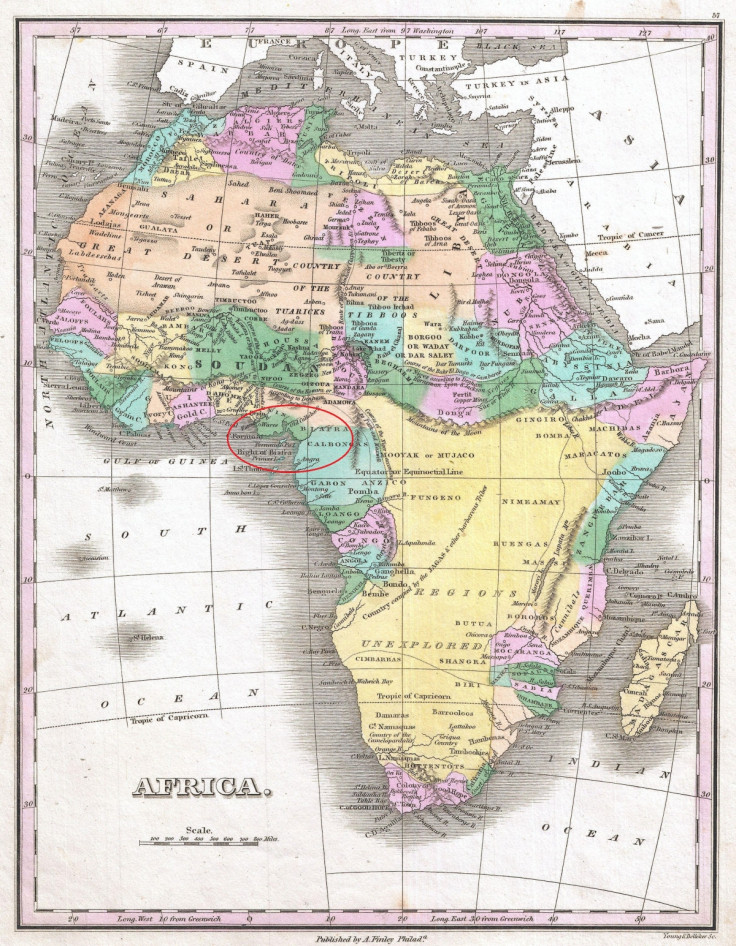Nigeria: Pro-Biafrans call for immediate release of leader Nnamdi Kanu 'arrested in Lagos hotel'

The leader of a separatist movement advocating for the independence of Biafra from Nigeria has reportedly been arrested in Lagos. The Biafran territories were independent from Nigeria from 1967 until 1970 and re-annexed to the African nation following a civil war that killed between one and three million people.
It is believed that Nnamdi Kanu, leader of the Indigenous People of Biafra (Ipob) and director of London-based radio station Radio Biafra, was apprehended by the Department of State Services (DSS) after he had flown from the UK, where he lives.
According to a Twitter handle affiliated with Radio Biafra, Kanu was arrested at the Golden Tulip Essential airport hotel on Sunday (18 October). IBTimes UK contacted the DSS, but has not received a response at the time of publishing.
The spokesperson for the Nigeria defence, Rabe Abubakar, was unable to confirm the arrest. An Ipob member who spoke with IBTimes UK under condition of anonymity said on Monday morning (19 October): "I can confirm to you that Nnamdi Kanu was detained illegally by the Nigerian DSS agents. He has not been released."
The arrest was also confirmed by David Otto, CEO of UK-based global security provider TGS Intelligence Consultants, who told IBTimes UK: "I can confirm that Nnamdi Kanu was arrested in Lagos last week and may still be in custody. The reason for the arrest is not clear." Otto added that Kanu might have been arrested in relation to his role in the activities of Radio Biafra, which the Nigerian government slammed as illegal. The government claimed in July that the National Broadcasting Commission (NBC) had managed to jam its signal.
An Ipob member, Ifeanyi Chijioke, wrote a letter on behalf of the group calling for world leaders to put pressure on the Nigerian government to release Kanu, according to Sahara Reporters. The letter reads: "It's in record that Nnamdi Kanu is a law abiding leader who has disciplined indigenous people of Biafra to strictly abide by local and international law.
"This is a gross provocation of indigenous people of Biafra and, as endangered people, would only wait shortly for due process and immediate release of her leader. The world should know that arrest of Mazi Nnamdi Kanu is the making of monster in indigenous people of Biafra and to prevent and save lives must world leaders stand up to their responsibility," the letter continued.
The alleged arrest came as the Nigeria police are cracking down on pro-Biafrans amid allegations that they are hosting violent protests. Earlier in September, dozens of pro-Biafrans were arrested after the inspector general of police, Solomon E Arase, released a statement urging authorities to clamp down on people who behaved violently across the country. It read: "This directive becomes imperative owing to recent activities of members of the Movement for the Actualization of the Sovereign State of Biafra [Massob] and the Indigenous People of Biafra [Ipob] in some parts of the country."
A perceived increase in pro-Biafran activities was also confirmed by the Anambra State commissioner of police, Hassan Karma, during another interview with IBTimes UK. He said: "It is people taking laws into their hands and it's the same situation that generated Boko Haram today in the north east. People started like this, even in Niger Delta, where militants started kidnapping people for extortion."
However, those who support the Biafra cause argued such claims only aim to smear the reputation of pro-Biafrans who, they say, are not and will never be a violent movement. Pro-Biafrans also accuse the police of being violent against the separatists. The police denied the claims, while rights group Amnesty International said in an exclusive report by IBTimes UK that there is "credible evidence that pro-Biafran separatists in Nigeria are targeted by police".

Biafra history
After the end of the British rule in 1960, Nigeria consisted of territories that were not part of the nation before the colonisation, resulting in escalating tensions among the communities.
People in the Eastern Region - a former federal division of Nigeria with capital Enugu - mainly from the Igbo community, wanted to secede due to ethnic, religious and economic differences with other communities in Nigeria. The Eastern Region gained independence following two coup d'etats in 1966 and 1967.
The fact that Nigeria's oil was located in the south of the country played a major role in the eruption of the war, during which medicine and food shortages in Biafra led to the death of thousands of people.
Biafra has been commonly divided into four main "tribes": the Igbos, the Ibibio-Efiks, the Ijaws and the Ogojas. The modern-day states that make up Biafra from the eastern region and mid-west are: Anambra, Enugu, Imo, Delta, Bayelsa, Abia, Cross River, Akwa-Ibom, Rivers, Ebonyi, southern part of Ondo State, Igbanke in Edo State, southern part of Benue State.
Amalgamation contract and birth of Nigeria

Pro-Biafrans cite the expiration of a so-called "amalgamation contract" as one of the reasons to justify their will to separate from the rest of Nigeria.
The contract was issued by Britain during the colonisation era and aimed at integrating people from the north and the south within 100 years since it was issued despite cultural, religious and economic differences among the various ethnic groups.
The contract, now at the National Archive of London, was created in 1914 by Frederick John Dealtry Lugard, the governor general of modern-day Nigeria. The document, opposed by the political class and the media in Lagos, expired in 2014.
The term "Nigeria" was created by Lugard's wife, British journalist Flora Shaw, in 1897 when she suggested to replace the "British protectorate of the Niger River" with a shorter term.
© Copyright IBTimes 2025. All rights reserved.





















